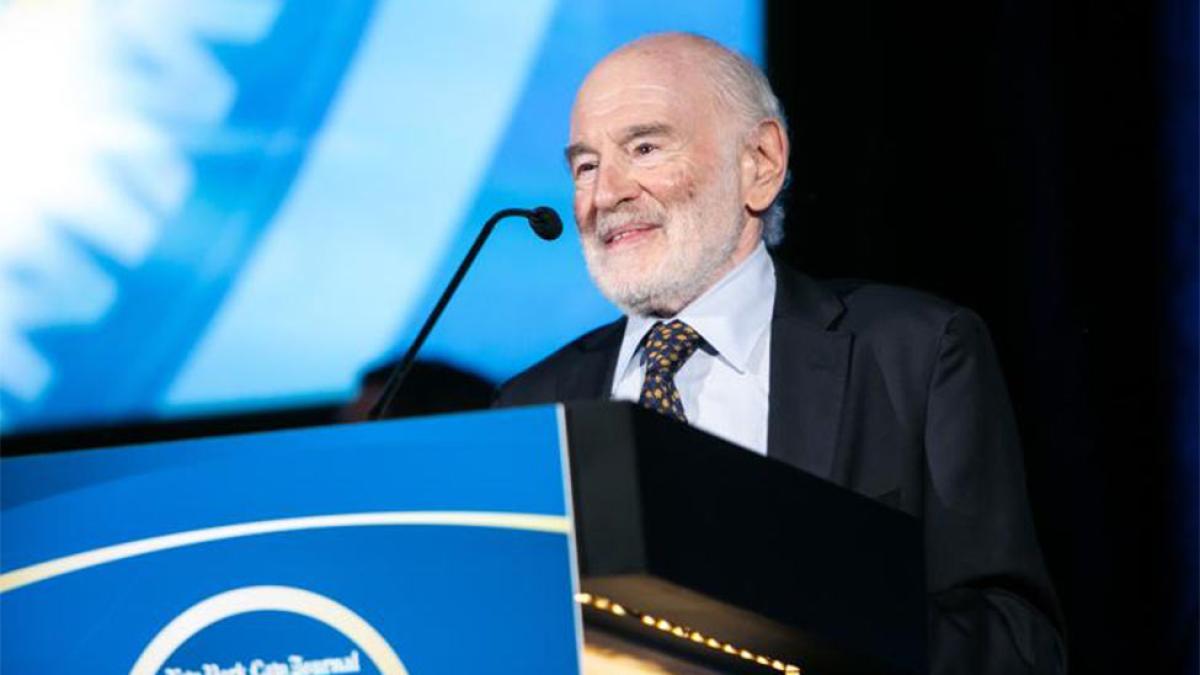
Elisabeth Haub School of Law Welcomes Three Prominent Members of the Legal Community to its Board of Visitors
The Elisabeth Haub School of Law at Pace University is pleased to announce that three new members have joined its Board of Visitors. All three members, Basil Seggos ’01, Jacqueline Hattar ’91, and Jud Siebert ’85, are distinguished Haub Law alumni.

The Elisabeth Haub School of Law at Pace University is pleased to announce that three new members have joined its Board of Visitors. All three members, Basil Seggos ’01, Jacqueline Hattar ’91, and Jud Siebert ’85, are distinguished Haub Law alumni.
“We are extremely fortunate to have a Board of Visitors comprised of innovative thought leaders in the legal community; the additions of Basil, Jackie, and Jud will bring tremendous value to Haub Law,” said Dean Horace E. Anderson Jr. “I look forward to working with them to ensure our continued success.”

Basil Seggos ’01 is a Partner and Senior Policy Director at Foley Hoag, LLP. Prior to joining Foley Hoag this summer, Mr. Seggos served as the longest-tenured Commissioner of the New York State Department of Environmental Conservation, from 2015–2024. He is widely known for his extensive experience creating and implementing groundbreaking policy focused on energy, climate, and the environment in both federal and state contexts. Among his many career accomplishments, Mr. Seggos was instrumental in the passage of New York’s nation-leading climate change law, the Climate Leadership and Community Protection Act, and served as the co-chair of its implementing body, the Climate Action Council. He also devised and was responsible for the $5.5 billion Clean Water Infrastructure Act and the state’s $4.2 billion environmental bond act. Mr. Seggos served as an officer in the US Army Reserve. He earned his BA from Trinity College in 1996 and his JD from the Elisabeth Haub School of Law at Pace University in 2001.
Jacqueline Hattar ’91 is a Partner in the White Plains and New York offices of Wilson Elser Moskowitz Edelman & Dicker, LLP. She is a seasoned litigator and former prosecutor, who has significant trial experience in all courts throughout New York State. Ms. Hattar focuses her practice on general tort liability and complex litigation, including premises liability, labor law/construction accident matters, and transportation/trucking litigation. Earlier in her career, she served for six years as an Assistant District Attorney in the Office of the District Attorney, Bronx County, NY. In addition to her practice, Ms. Hattar is an elected Director for the Westchester Women’s Bar Association (WWBA), co-chairs the WWBA’s Litigation & DEI Committees, and is a two-term past Vice President of the WWBA (2019–2021). She received a BA in Political Science from Fordham University in 1988, and her JD from the Elisabeth Haub School of Law at Pace University in 1991.
Jud Siebert ’85 is a Member at Keane & Beane P.C. His practice is devoted to the representation of public and private sector clients in litigation involving land use, municipal, real property, and real property tax assessment disputes. Mr. Siebert also represents builders, property owners and developers, commercial enterprises, utilities, and individuals in land use applications before local zoning and planning boards throughout southeastern New York State. He has assisted his clients in securing approvals for residential, commercial, franchised business, biomedical research, wireless communication, sewer and water utility, and public purpose projects. In addition, Mr. Siebert serves as special counsel to the governing bodies of cities, towns, and villages, as well as counsel to local planning and zoning boards of appeals. He earned a BA from Purdue University in 1982 and his JD from the Elisabeth Haub School of Law at Pace University in 1985.
The Board of Visitors furthers the interests of the Law School by involving alumni and friends in significant issues of concern to the School, and by building a sense of community that fosters pride and participation. The Board is also dedicated to fostering a strong interest in the mission of the Law School by helping to recruit outstanding students, hiring graduates and encouraging financial support from public and private sources. The Board is currently co-chaired by Alfred E. Donnellan '81, Managing Partner, DelBello Donnellan Weingarten Wise & Wiederkehr, LLP and Kathleen Donelli ’85, Partner, Goldschmidt & Genovese, LLP.
About Elisabeth Haub School of Law
Elisabeth Haub School of Law at Pace University offers JD and Masters of Law (LLM) degrees in both Environmental and International Law, as well as a Doctor of Juridical Science (SJD) in Environmental Law. The School, housed on the University’s campus in White Plains, NY, opened its doors in 1976 and has more than 10,000 alumni around the world. The School maintains a unique philosophy and approach to legal education that strikes an important balance between practice and theory. Haub Law launched its Environmental Law Program in 1978, and it has long been ranked among the world’s leading university programs, with a current #1 ranking by U.S. News & World Report. See more information about Haub Law.
A Storyteller’s Journey: Q+A with Award-Winning Author Christina Wyman
Christina Wyman ’02, a best-selling author and educator, has built a career writing stories that resonate with both children and adults. In this interview, she shares how her time in the Media, Communications, and Visual Arts Department helped shape her path to becoming a successful writer.
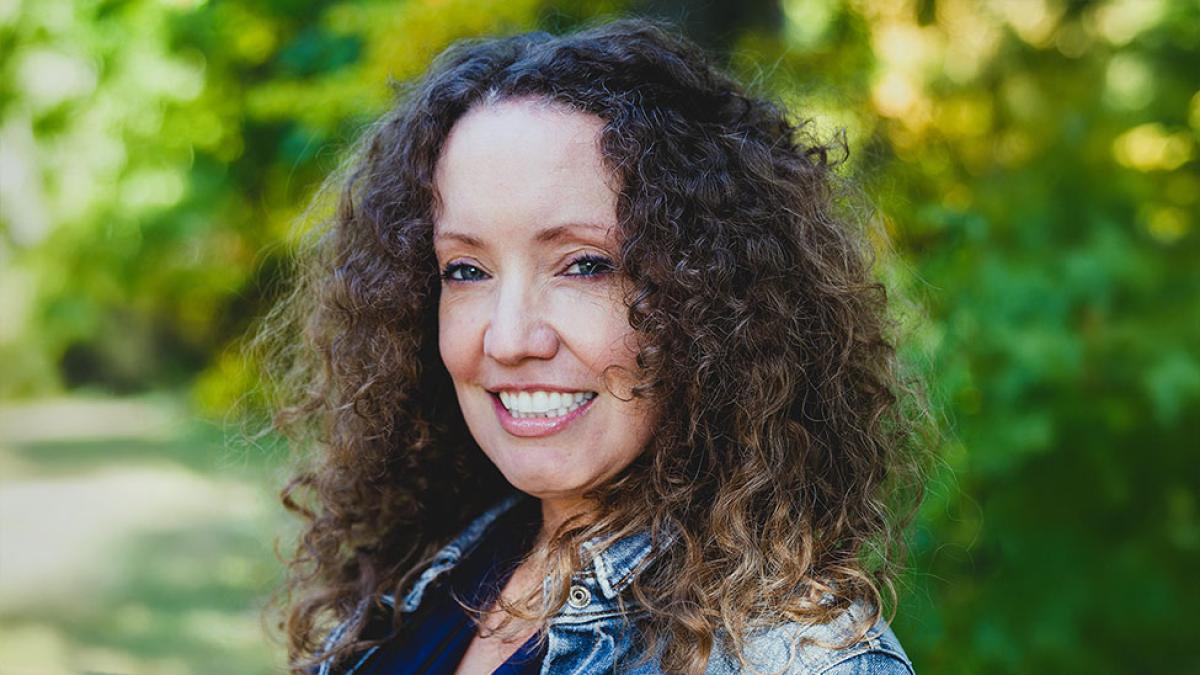
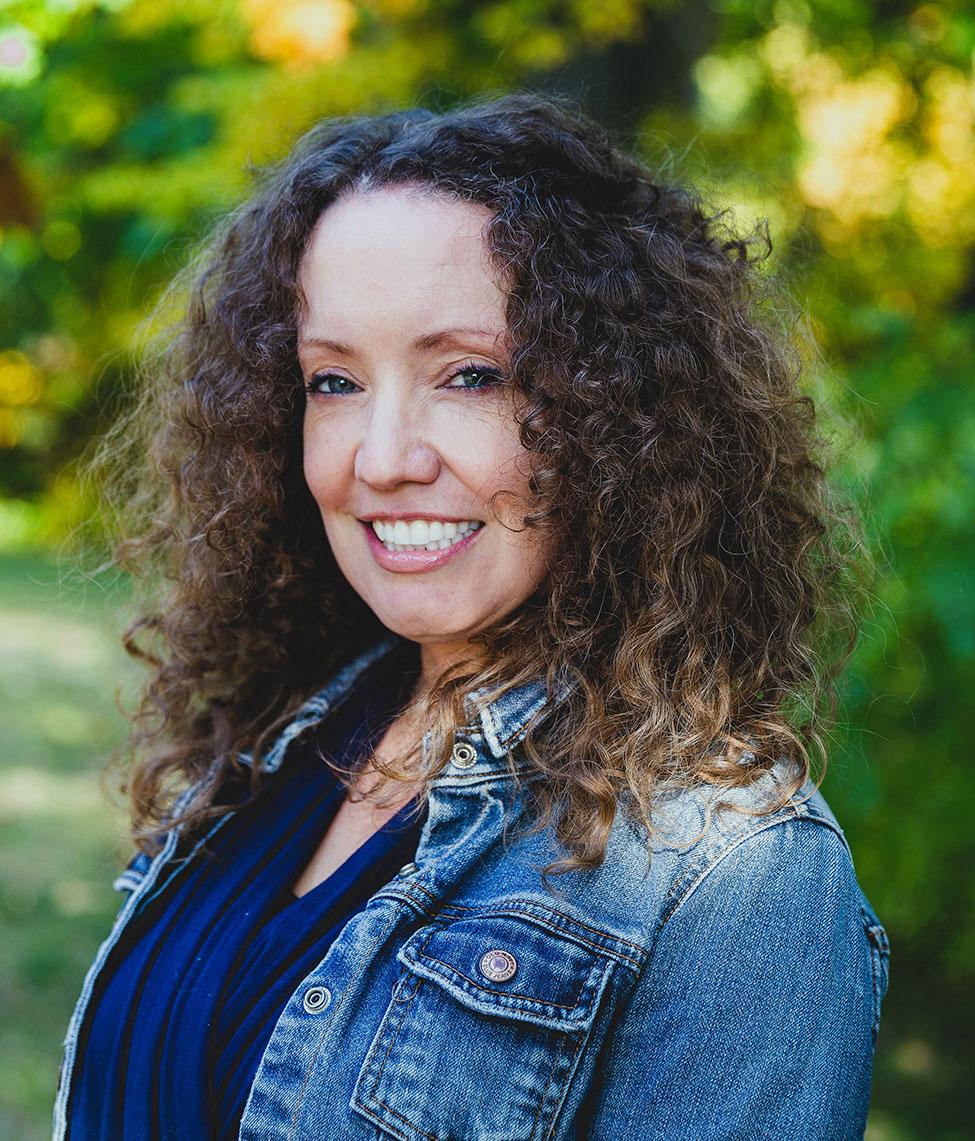
Christina Wyman
Class of 2002
An educator by trade, Christina Wyman is a multiple Best Book award winner and USA Today best-selling author of children’s books, including her debut novel, Jawbreaker, Slouch (October 2024), and Breakout (slated for a 2025 release), as well as a freelance writer for major news outlets.
Please tell us about the inspiration behind your publications.
With my children’s books, I write the stories that I wish I would have had access to as a child–stories that go deep with the struggles around painful family dynamics, socioeconomic precarity, emotional trauma, middle-grade angst, and other issues. I am very grateful to have the opportunity to unleash the stories that live inside me and that they are well received.
When it comes to my nonfiction essays, and when I’m pitching a major news outlet with an idea for an op-ed, it’s typically because I’m inspired by a current national discussion I feel I have something to contribute to by way of a unique perspective. My most fiery pieces often come from a place of deep irritation with the world around me (such as my essay about child-free cat-lady stereotypes, which landed with the Today Show).
Why did you choose to pursue a BA in Communications and how has your degree prepared you for your career?
The communications major, then-helmed by Professor Robert Klaeger, MS, and Maria Luskay, EdD, really spoke to me. The career options available to students were limitless; if I wanted to go into broadcasting, I could. If I wanted to write professionally, I could. If I wanted to go into public relations or radio, I could. As it turned out, I use my communications major to both inform what I bring to the classroom as a teacher and in my work as a writer.
How have your studies influenced the subject matter in your books?
My children’s books often incorporate the “stuff” of being a communications major. During my time at Pace, that meant learning a lot about broadcasting, journalism, media, public speaking, and many other avenues and topics germane to the major. Each of my books so far has aspects of my time as a student infused into the plots in both major and minor ways, and that are relevant to young people, such as writing for the school newspaper or joining a debate team.
Why did you choose to attend Pace and what activities and organizations were you involved in as a student?
I ultimately decided on Pace because of its Pleasantville campus. It is quaint and beautiful and situated in a part of New York State that my working-class roots did not really have access to in any real, sustained way, prior to those years. This kid from Brooklyn wanted to feel like she could be anything and go anywhere. That’s what going to Pace did for me.
“I use my communications major to inform both what I bring to the classroom as a teacher and in my work as a writer.”
When I attended Pace, I occasionally wrote for the school newspaper, was a member of several honors societies, and was also both a disc jockey for WRPW Pace University Radio Westchester (which could not have been a more fun gig) and sold ad space for them.
What were your experiences like in the Media, Communications and Visual Arts (MCVA) department? How had MCVA faculty been instrumental in your journey as a student?
Professor Maria Luskay, EdD, Professors Emeriti Robert Klaeger, MA, Daniel Bender, PhD, Diane Cypkin, PhD, and other Media, Communications and Visual Arts Department faculty gave me some of the best, most memorable years of my life. They were kind, accessible, and really worked hard to help us students shape the lives we wanted to live. They laughed with us but were also hard on us when they needed to be. They held us to high standards and brought in masters from the field and helped us forge connections. When I think of everything my professors gave to us, I can only hope that I model the same for my own students.
College is a significant time in a person’s life. In what ways has your time as a Pace and Dyson student influenced you to become the person you are today?
I think college is a real bootcamp in growing up and learning to advocate for yourself, and if it’s not, it should be. I attended Pace on a federal grant awarded to students with exceptional financial need, and, as a first-generation college student, did not have the same (or any) connections or resources many of my peers from Westchester County had at their disposal.
Even though I am now in a very different place, the ethic that fuels my work today is very much informed by my time as a student. As an educator, I also think I’m deeply sensitive to, and mindful of, students who are up-and-coming, and I often draw on my own years in college to support those without the built-in resources necessary for academic survival. Pace provided students like me with opportunities I didn’t even know existed, and I try to pay it forward.
What advice would you give to our students, as they navigate their college life?
My advice is that everything counts, even if it doesn’t seem to directly relate to what you think you’re going to be doing with your future. We often think we know exactly what we want to do with our lives as we move through our major and toward graduation, but that couldn’t be further from reality. We evolve after college, and our interests change. I never thought I’d be an educator and an author of children’s books. As it turns out, many of my experiences at Pace continue to inform and impact my life now.
Christina Wyman is a USA Today bestselling author and teacher living in Michigan. Her new middle-grade novel, “Slouch,” is about a tall girl navigating friends, family, self-esteem, and boundaries, and will be available fall 2024 wherever books are sold, including through local independent bookstores. Her debut novel, “Jawbreaker,” a middle-grade book that follows a seventh grader with a craniofacial anomaly, is a Publishers Weekly Best Books of 2023.
Circuit Breakers: Seidenberg Holds the Pleasantville Grand Prix
On October 1 2024, Seidenberg held its first ever Pleasantville Grand Prix, Seidenberg’s spin on the traditional car races we watch on TV.
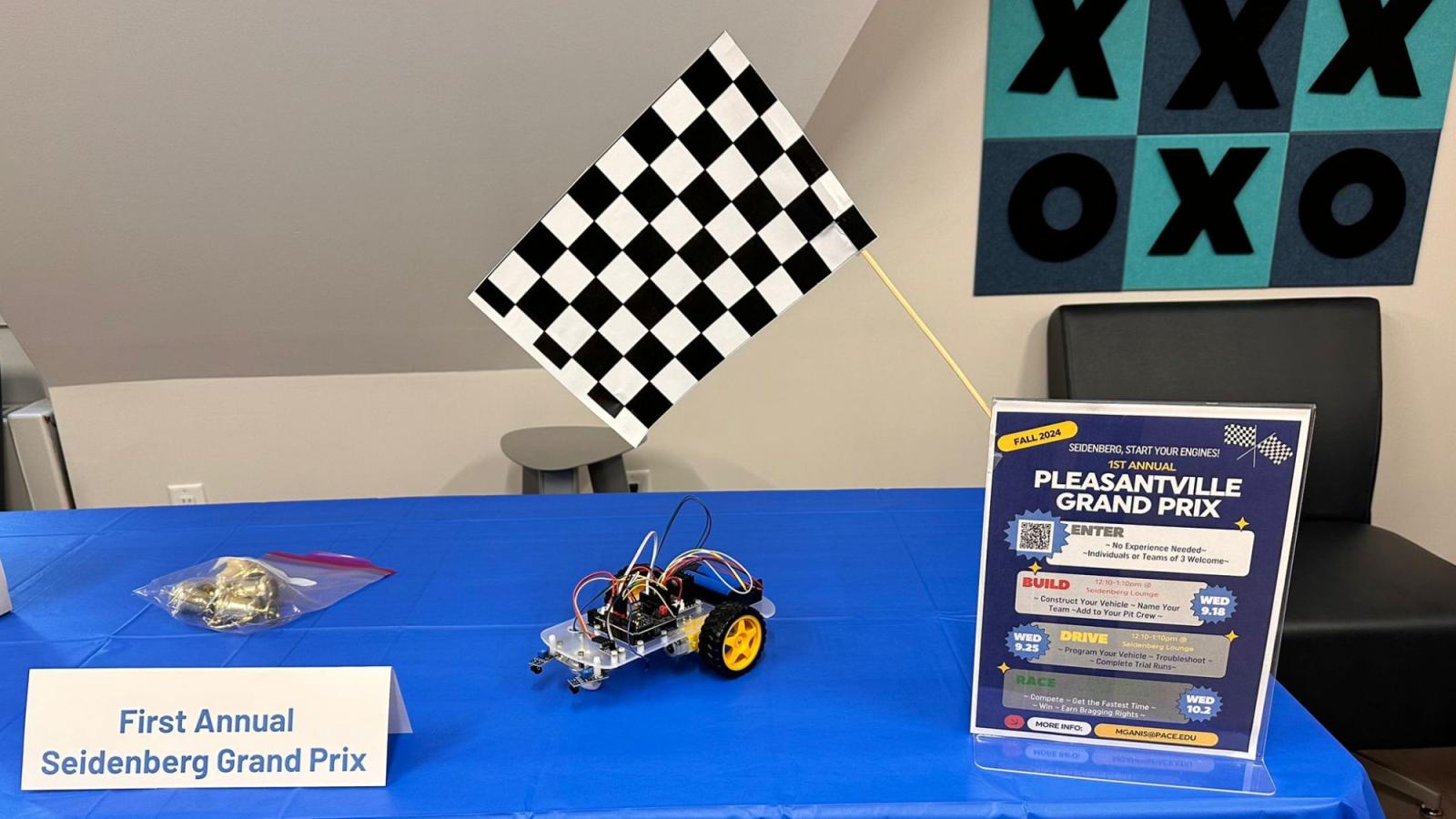
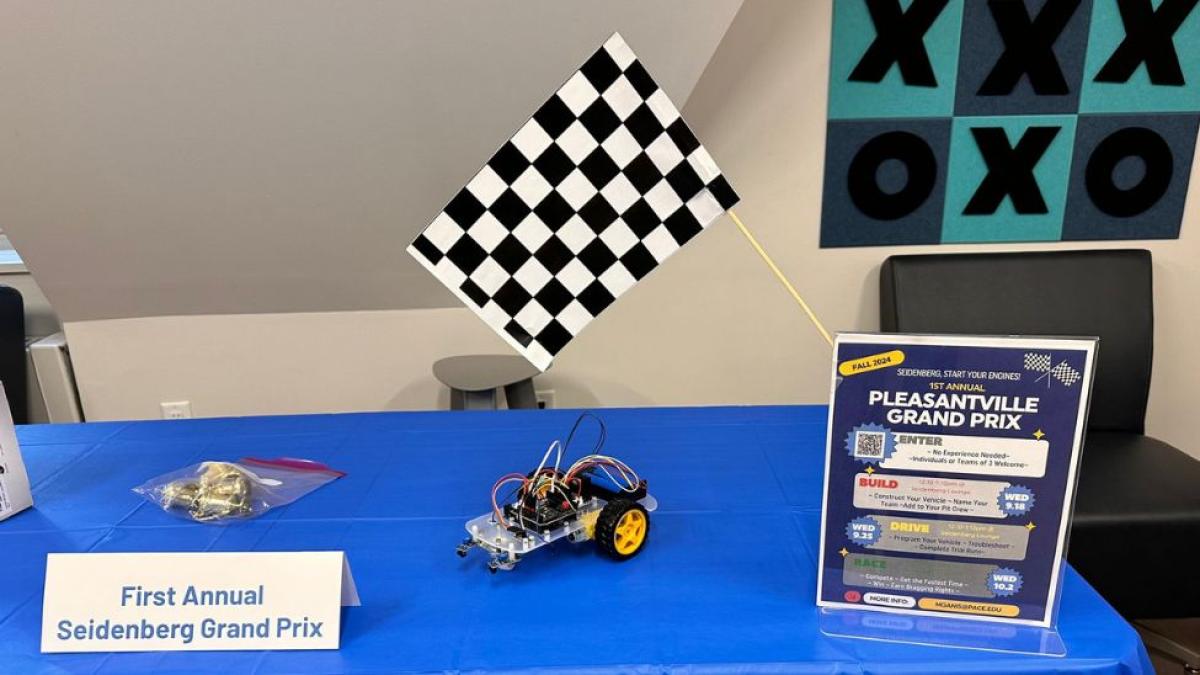
If you were within earshot of the Goldstein Academic Center on Tuesday, October 1, 2024, you likely heard a lot of cheering and whooping at around 2:30pm. It was on this day and at this time that Seidenberg held its first ever Pleasantville Grand Prix, Seidenberg’s spin on the traditional car races we watch on TV. Led by Computer Science Professor, Dr. Matthew Ganis, this event was loads of fun and is sure to become an annual event on the Pleasantville campus.
The concept for the Grand Prix was born from the desire to create engaging programs that would appeal to a wide range of student interests. “Seidenberg students love a challenge,” notes Dr. Ganis, “and we wanted to come up with a way to reach students seeking to expand both their hardware skills as well as their programming skills.” The decision was made to use robot cars as the vehicle (pun intended) for this experience.
Like other Grand Prixes, Seidenberg’s event spanned multiple days. There was a kickoff event at which student teams, or ‘pit crews,’ received their disassembled car kits and began the construction phase. Next, crews got together to fine-tune their assembly and to begin programming. Throughout the process, students were able to share their own expertise as well as learn from their peers. “The complementary strengths of each of the participants made the event and experience that much more fun” shares Dr. Ganis.
The final event included races between the cars, as well as performance trials for individual cars. Points were awarded based on the car’s speed and its ability to remain on a predetermined track. After several heats of races, and lots of cheers from peers and professors on the sidelines, a clear winner (Car #1) emerged. In addition to earning bragging rights, the team who built the winning car will also have their name on a flag that will hang prominently and proudly in the Seidenberg Lounge.
And cars were not the only things built throughout this process, as relationships were also forged. Students on the same team, many of whom were strangers before this event, are now bonded by a shared experience of teamwork and camaraderie. In addition, students got a chance to work with and learn from one of their professors outside the classroom. So, although only one car could be named the champion, all who participated were winners!
Marc Bisogno ’25: A Passion for Advocacy
Having grown up in a family full of lawyers – from his father to his cousins, and most recently his sister – from a young age Marc Bisogno ’25 aspired towards a career in law. He was drawn to Haub Law in particular because of the atmosphere of support on campus.
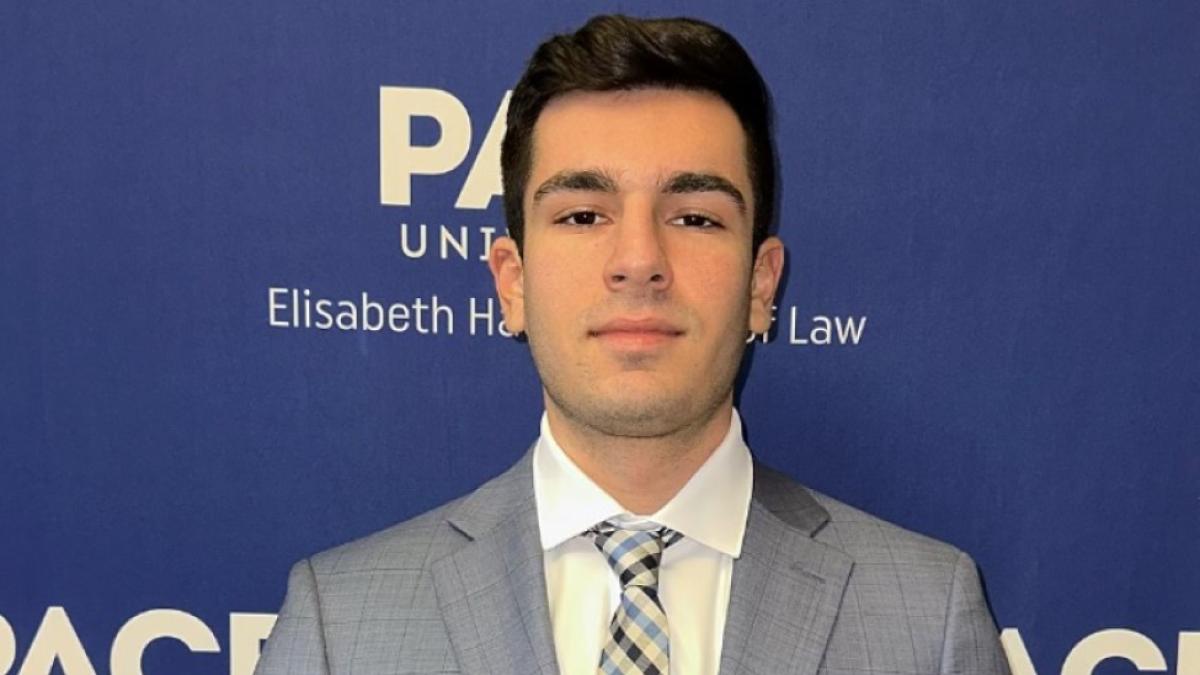
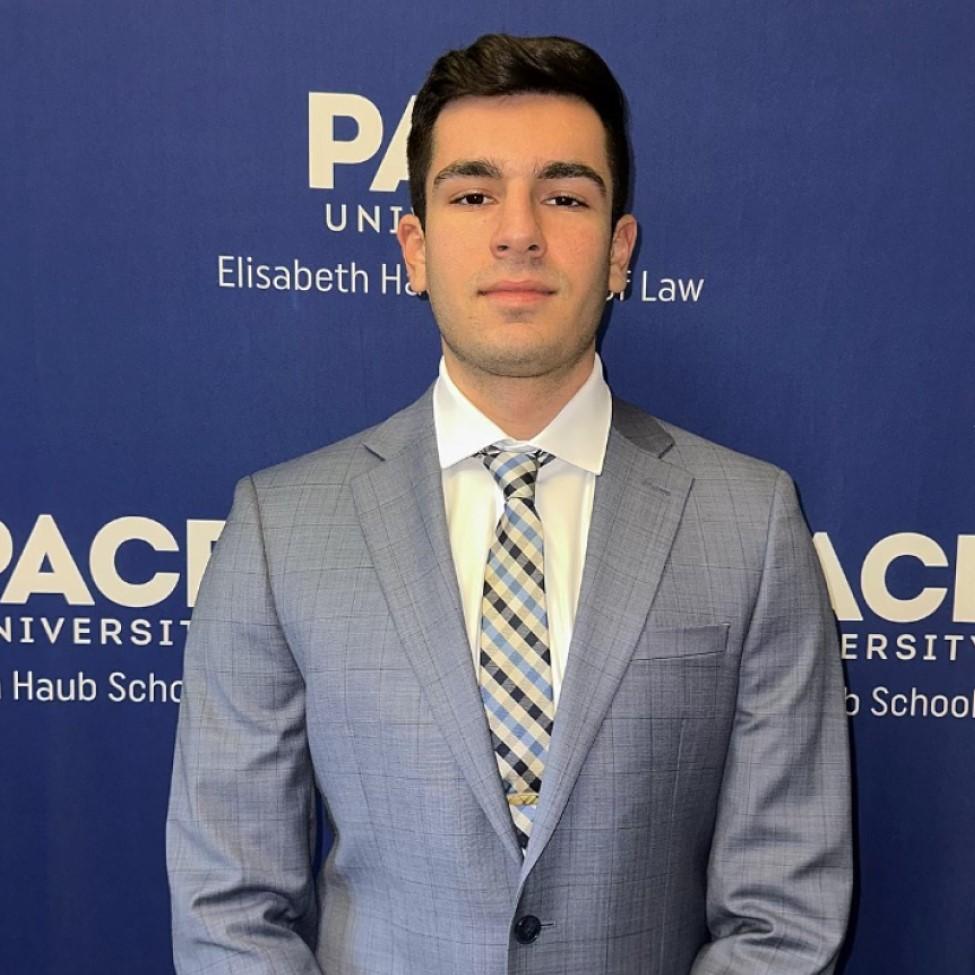
Having grown up in a family full of lawyers – from his father to his cousins, and most recently his sister – from a young age Marc Bisogno ’25 aspired towards a career in law. He was drawn to Haub Law in particular because of the atmosphere of support on campus. “Everyone genuinely wants to help you succeed,” said Marc. “Whether it is the professors, dean’s scholars, or my peers, I have always had someone to rely on and enhance my law school experience.”
Since starting Haub Law, Marc has found his passion in advocacy. “Being a part of the advocacy program has been my favorite experience in law school thus far. I played Division I college baseball and after that ended, I found myself searching for a new challenge to fill that competitive void that sports occupied. The advocacy program was the perfect opportunity to bring my competitive drive to law school.” Marc describes his initial experiences in advocacy competitions as challenging, but as his confidence grew, he found his advocacy skills followed. “Last spring my team was able to take home first place in New York Law School’s third annual Soccer Negotiation Competition. It was a great experience to see the hard work pay off and to be able to contribute to Haub Law’s top rank advocacy program.”
Marc also has found a strong interest in alternative dispute resolution. “I was part of a small group of students who helped revitalize the ADR society at Haub Law,” said Marc. “As the president of the ADR society, the E-board and I were tasked with helping grow ADR throughout the law school community. It has been a pleasure to see ADR gain traction, not only through the ADR Society but in the advocacy program as well.”
Over the summer, Marc worked as an intern at the Staten Island Supreme Court with Judge Orlando Marrazzo, Jr. Marc’s immediate goals are to pass the bar exam, excel in his first post-law school position, and eventually pursue a career in sports law, personal injury, or another practice area. “Law school can appear very intimidating, but with good time management skills and a lot of discipline it is achievable, especially with the support of a school like Haub Law.”
Haub Law's Advocacy Season Kicks off with Several Competitions, Including an Exclusive "Golden Ticket" to the Summit Cup
A team of students from the Elisabeth Haub School of Law at Pace University’s Advocacy Program received a “Golden Ticket” to participate in the prestigious 3-day Summit Cup Mock Trial Competition October 3–5, 2024, hosted by the University of Denver – Sturm College of Law.
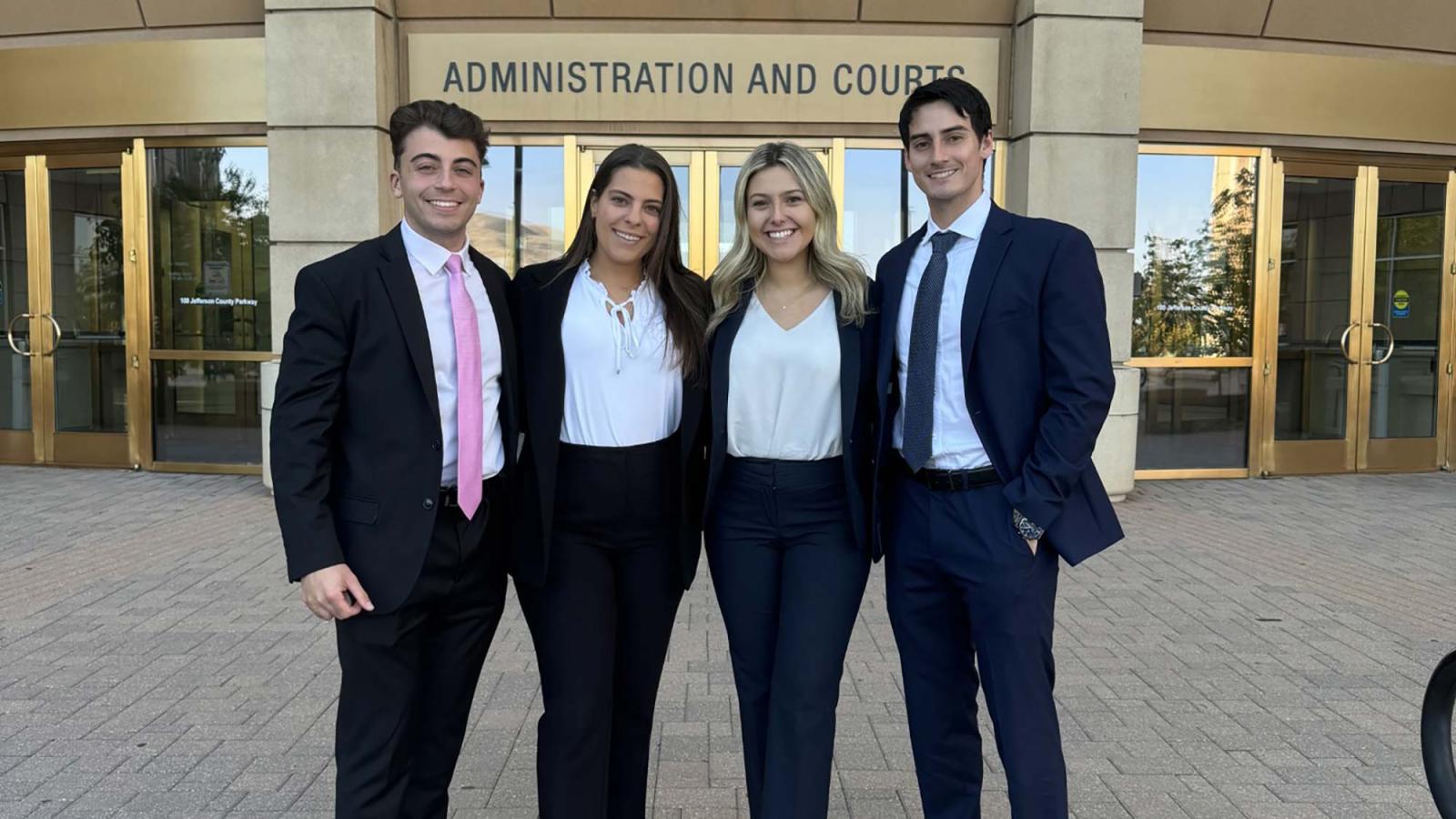
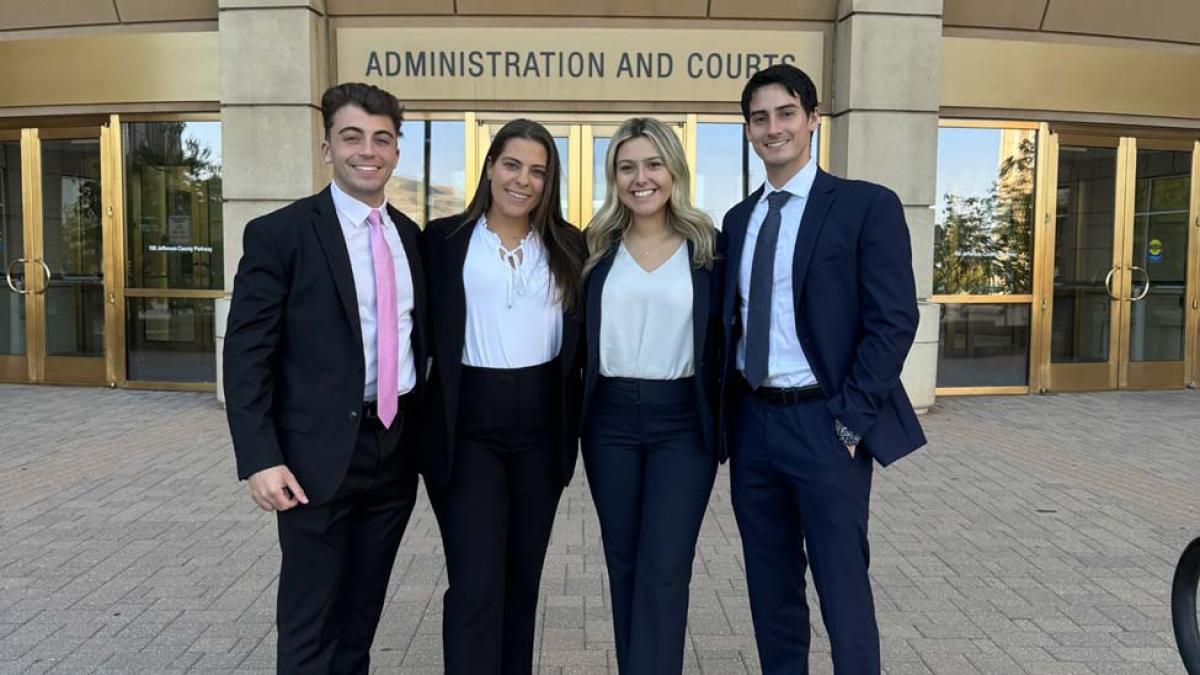
The Elisabeth Haub School of Law at Pace University kicked off its 2024 advocacy season with several exciting competitions over the last few weeks, highlighting the strength and talent of its advocacy teams.
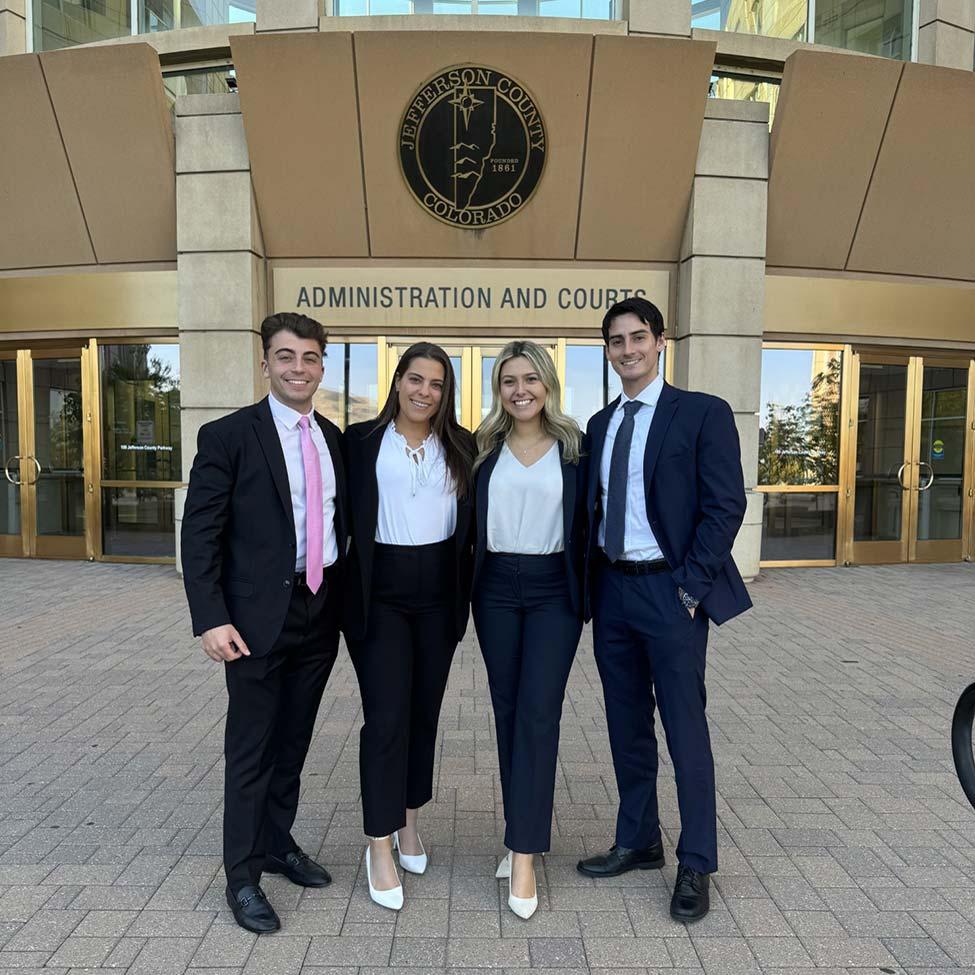
A team of students including 3L Madison Lane, 3L Steven Caputo, 2L Alexa Saccomanno and 2L Carlos Erazo, received a “Golden Ticket” to participate in the prestigious 3-day Summit Cup Mock Trial Competition October 3–5, 2024, hosted by the University of Denver – Sturm College of Law, marking yet another milestone for the Law School’s top ranked program. This invitation-only competition is reserved for law schools that won advocacy competitions the previous year, and extended to only 12 top law schools, making this an elite competition in the world of legal advocacy.
The Summit Cup competition is structured with four rigorous tournament rounds, culminating in a Championship round. One of the elements that makes the Summit Cup particularly unique is its inclusion of laypeople as jurors, which provides a realistic jury panel experience, emulating real-life courtroom dynamics. The competition also employs "advocacy scoring," which helps simulate a juror's impressions of the advocates' performance, adding another layer of realism and challenge. During the competition, each team is provided with an “Assigned Woodshed Witness” from the host school, serving as one of the team's witnesses throughout the event.
Although the team did not advance to the final Championship round, they delivered exceptional performances in every stage of the tournament. The team’s success was bolstered by the support of their dedicated coaches, Chloe Devanny ‘24, Samantha Tighe ‘20, and Nicolette Brusco, Esq ‘21.
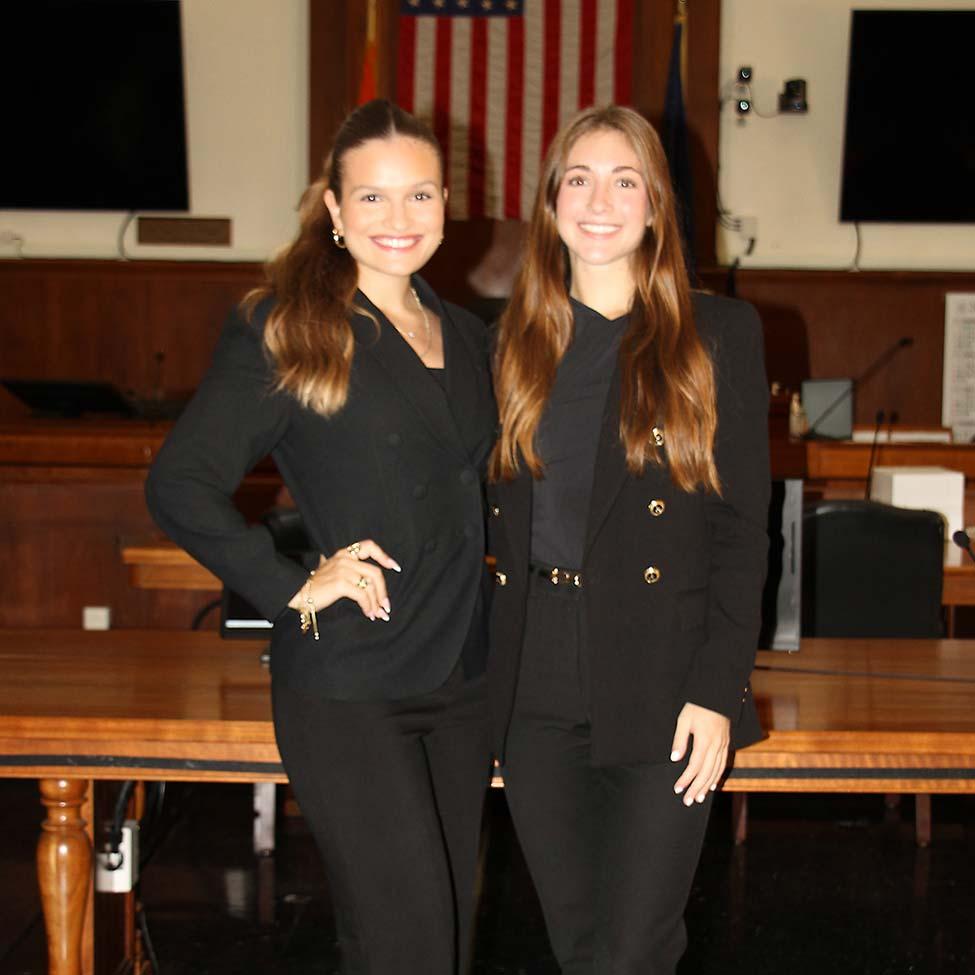
Additionally, a Mock Trial Team including 3Ls Paige Padula and Katerina Balukas participated in the First Chair Competition held from September 13–15, 2024. Hosted by Hofstra Law, UCLA Law, and the University of San Diego School of Law, the competition brings together law schools excelling in teaching trial advocacy. Katerina, who represented the prosecution, won her round against the University of South Carolina, while Paige, representing the defense, won a round against Drexel Law School and tied against Hofstra. Both students had only two weeks to prepare their sides of the case, highlighting their impressive advocacy skills. Their coaches, Kathryn Facelle ’23 and AJ Muller ‘18, praised their performance and dedication to the competition.
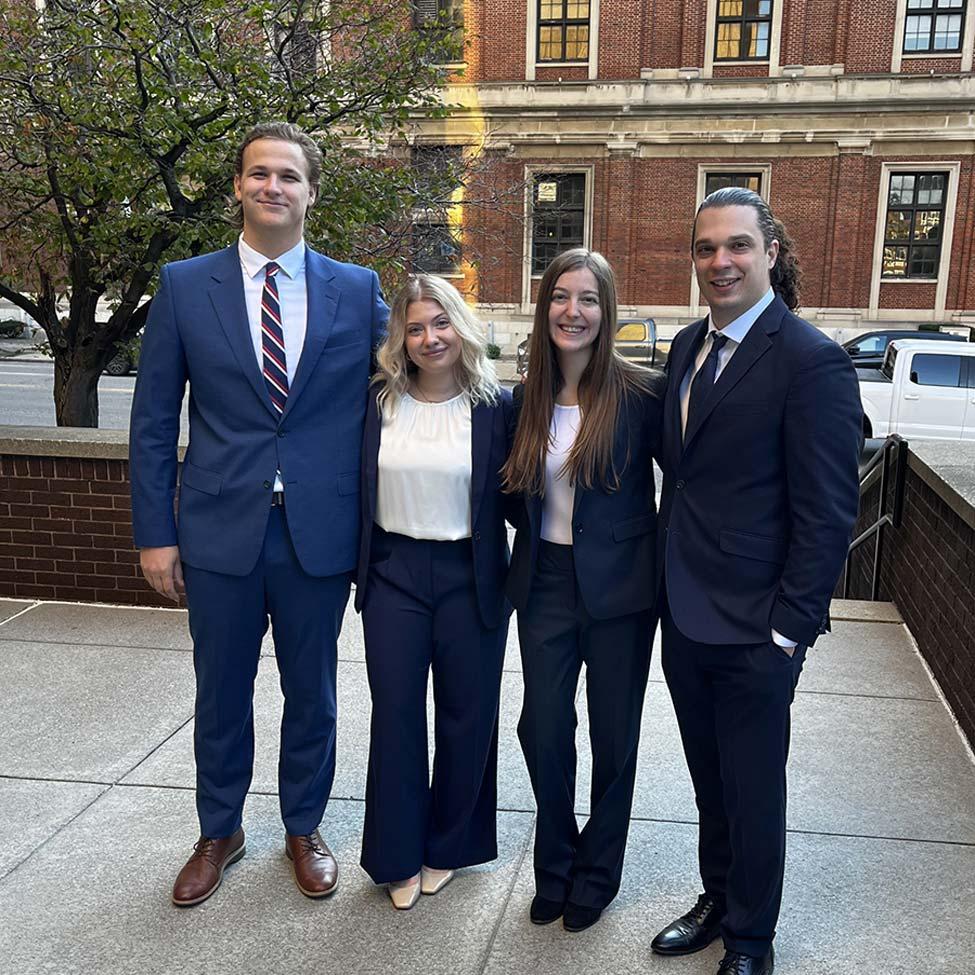
A Haub Law student team also participated in the Buffalo-Niagara Trial Competition, held from October 4–5, 2024. The team, consisting of 3L Julia Stueber and 2Ls Maiya Aubry, Samson Bosco and James Page, delivered strong performances under the guidance of their coach Jack Logan ’20, winning three out of four rounds. The competition is one of the largest in the country, with nearly 30 schools participating each year. Teams are challenged with intricate homicide fact patterns, requiring high-level trial advocacy skills.
“We are incredibly proud of all our teams and their outstanding achievements,” said Director of Haub Law’s Advocacy Programs and Professor of Practice, Louis Fasulo. “This is just the beginning of what promises to be a remarkable season of competition. The 'Golden Ticket' marks a historic moment for us, and we look forward to many more successes throughout the year."
Equity in Education
Pace President Marvin Krislov writes an opinion piece in Diverse: Issues In Higher Education discussing the need for stronger partnerships between universities, K-12 educators, and policymakers to address systemic educational issues and enhance financial aid accessibility.
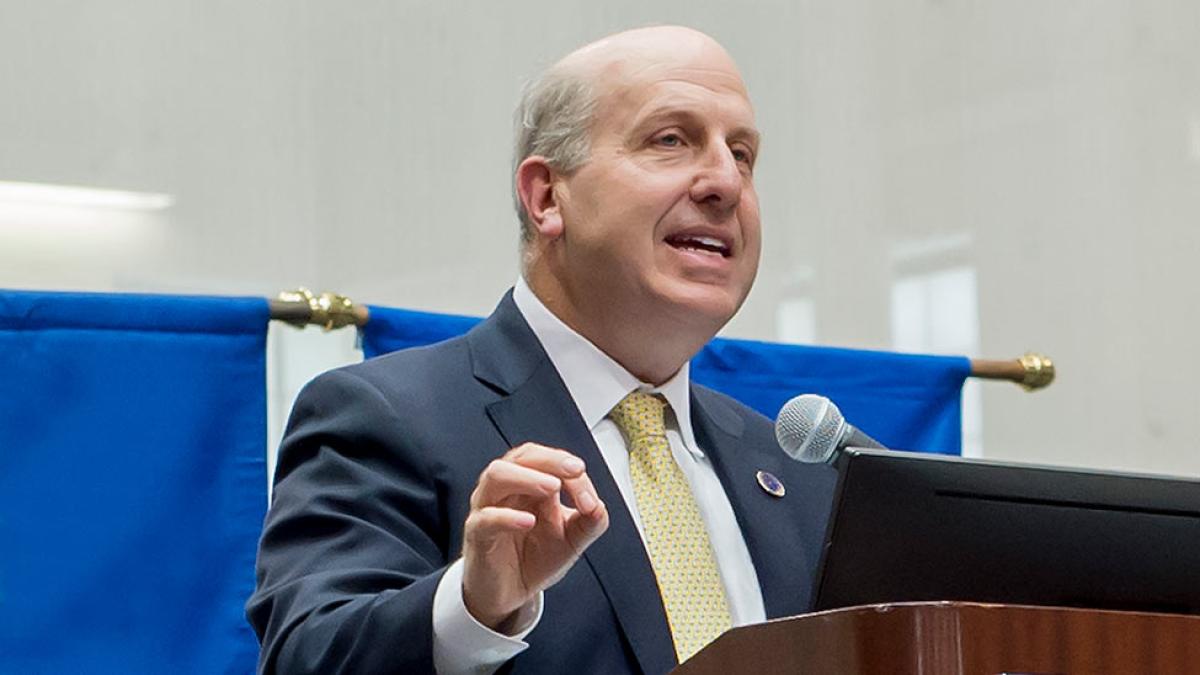
Debate Continues Over Updating NY’s Wrongful Death Law
Elisabeth Haub School of Law Professor Bennett Gershman speaks to News12 Westchester about the ongoing debate over New York’s wrongful death law, calling it “one of the most limited, restrictive laws in the country, second only to Alabama.”
Get Paid To Combat Campaign Donor Fraud
Dyson Professor Laura Tamman co-authors an op-ed in the New York Daily News following recent charges against Mayor Adams related to campaign activities. In the column, Tamman underscores a fact often overlooked by New Yorkers: whistleblowers who report fraud and help bring wrongdoers to justice may qualify for financial rewards under the False Claims Act.
"He Has Zero, Nothing": Legal Experts Say Trump Has "No Factual Defense" Against Jack Smith Filing
Professor Gershman provides legal insight on the potential for the Supreme Court to once again intervene in favor of Former President Donald Trump, despite the extensive evidence presented by Special Counsel Jack Smith in Trump’s election interference case.
